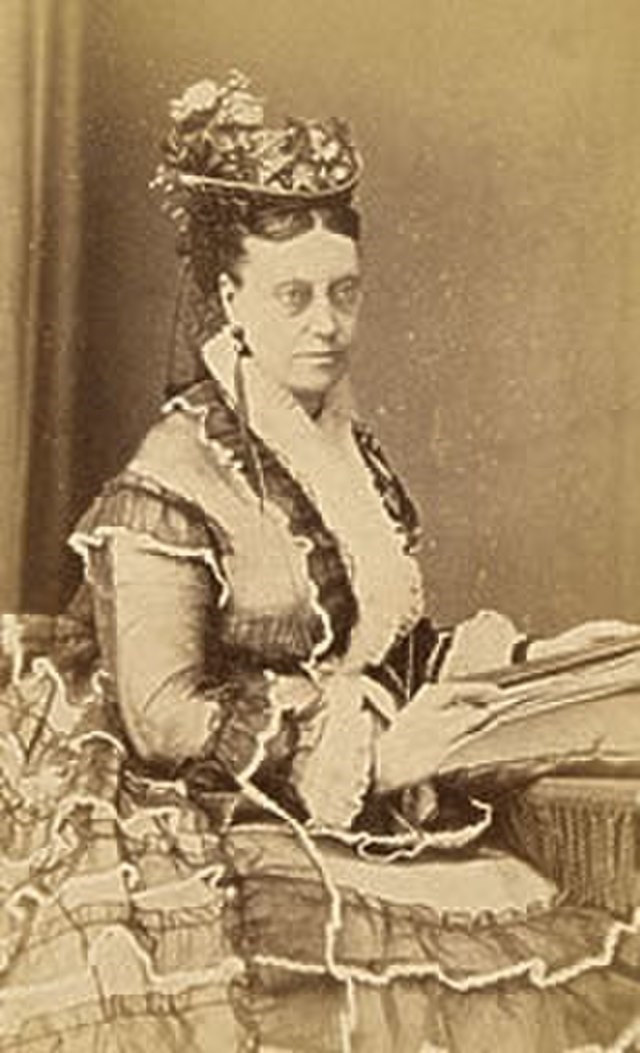 Wikimedia CommonsLydia Ernestine Becker
Wikimedia CommonsLydia Ernestine Becker
Lydia Ernestine Becker, born on February 24, 1827, in Manchester, England, was an amateur scientist and leader in the suffrage movement in the United Kingdom. Becker both founded and published the Women’s Suffrage Journal for twenty years from 1870 up until her death in 1890.[1] She also helped to firmly plant the city of Manchester as one of the cities at the heart of the suffrage movement, working closely with Richard Pankhurst (husband of Emmeline) in arranging for the first woman to vote in a British election.[2]
Like most girls during the 1800s in Britain, Becker received her education at home. She had a particular interest in both astronomy and botany, interests which her uncle encouraged her to pursue.[3] She was awarded a gold medal in 1862 for an academic paper which she wrote on horticulture. Becker even became one of the many women who informed the scientific work of Charles Darwin; she began writing letters and sending numerous plant samples from her hometown to him.[4] She formulated a method to preserve the plants without altering their natural color, a method for which she was awarded a national prize.[5]
Despite these accolades, Becker is not primarily known for her scientific work. The majority of her life, and what she is most recognised for, is her contributions to the suffrage movement in the U.K. Her passion was sparked upon reading a paper titled Reasons for the Enfranchisement of Women by Barbara Bodichon. In 1867, she formed the Manchester Women’s Suffrage Committee and organized their first meeting.
It was here that she met Richard Pankhurst. After shop owner Lilly Maxwell’s name accidentally appeared on the voter register following her husband’s death, Becker accompanied Maxwell to the polling station on election day. As her name was on the register, officers had no choice but to allow Maxwell to vote. Becker and Pankhurst then used this when building a case for suffrage to present in court.[6]
After appearing to lecture at the first meeting of the National Society for Women’s Suffrage in 1868, Becker set on a tour across the north of England to represent the society and lecture. Less than a year later, the society managed to secure votes for women, but only in local elections.[7]
Becker’s suffrage and scientific work perhaps influenced her decision to advocate for education for women and girls. In 1870, her campaign to allow women to be appointed to school boards was successful; she and four other women began serving on the board of the Manchester School. Becker served on the board until she died in 1890.[8] She advocated for an un-gendered educational system in the U.K., a notion underpinned by her belief that women are the intellectual equal of men.
Also in 1870, Becker collaborated with her good friend Jessie Boucherett to found the Women’s Suffrage Journal. The publication included lectures in print, correspondence of various suffragists both between themselves and their opponents. It was extremely popular amongst suffragists. Despite this, Becker’s beliefs were not always in line with those of many of her fellow suffragists. For instance, Becker remained steadfast in her belief that both married and unmarried women should have the right to vote. She argued that unmarried women were even more in need of the right to vote than their married counterparts. Even many suffragists did not advocate for unmarried women.[9]
Lydia Ernestine Becker dedicated her life to the advocacy of women. Despite being an award-winning scientist and botanist, she shifted the focus of her life’s work to the empowerment of women. It is thanks, in part, to the work of Becker and her fellow suffragists that we are on our way to closing the gender gap.
[1] Lydia Becker. [Online] Available https://middletonheritage.co.uk/lydia-becker/.2018.
[2] Lydia Becker. [Online] Available https://en.wikipedia.org/wiki/Lydia_Becker.2024.
[3] Ibid.
[4] Lydia Becker. [Online] Available https://middletonheritage.co.uk/lydia-becker/.2018.
[5] Ibid.
[6] Lydia Ernestine Becker (1827 - 1890). [Online] Available http://www.natstand.org.uk/time/BeckerLEtime.htm.2023.
[7] Ibid.
[8] Lydia Becker. [Online] Available https://en.wikipedia.org/wiki/Lydia_Becker.2024.
[9] Ibid.
Page created on 2/23/2024 10:20:30 PM
Last edited 2/28/2024 2:22:44 PM
, . Lydia Becker. [Online] Available https://middletonheritage.co.uk/lydia-becker/.2018.
, . Lydia Becker. [Online] Available https://en.wikipedia.org/wiki/Lydia_Becker.2024.
, . Lydia Ernestine Becker (1827 - 1890). [Online] Available http://www.natstand.org.uk/time/BeckerLEtime.htm.2023.
